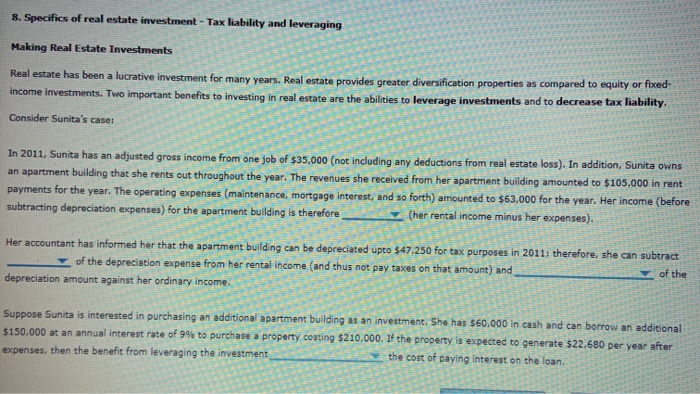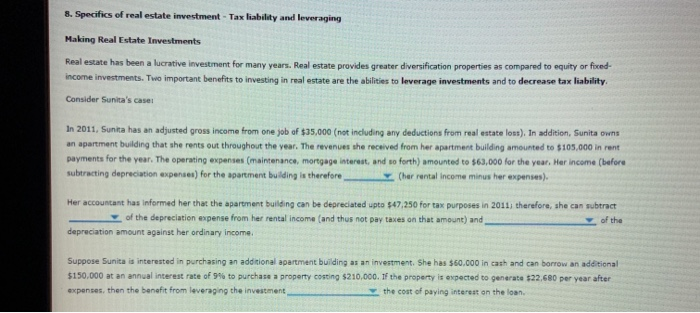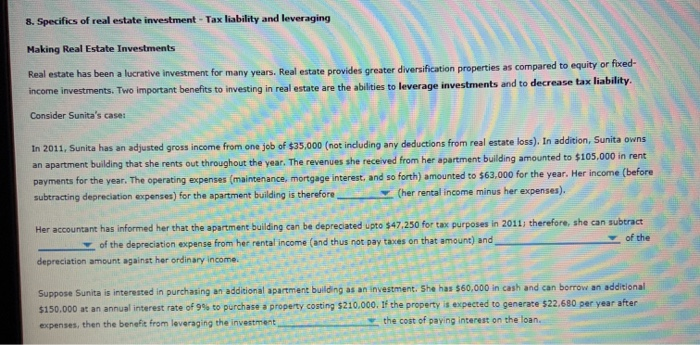possible options
1) $5,250/$47,250/$42,000
2) $5,250/$47,250/$42,000
3)50% of the remainder/the remaining $42,000/ the remaining $5,250
4)outweighs/does not outweigh

8. Specifics of real estate investment - Tax liability and leveraging Making Real Estate Investments Real estate has been a lucrative investment for many years. Real estate provides greater diversification properties as compared to equity or fixed income investments. Two important benefits to investing in real estate are the abilities to leverage investments and to decrease tax liability Consider Sunita's case: In 2011, Sunita has an adjusted gross income from one job of $35.000 (not including any deductions from real estate loss). In addition, Sunita owns an apartment building that she rents out throughout the year. The revenues she received from her apartment building amounted to $105,000 in rent payments for the year. The operating expenses (maintenance, mortgage interest, and so forth) amounted to $63,000 for the year. Her income (before subtracting depreciation expenses) for the apartment building is therefore__ (her rental income minus her expenses). Her accountant has informed her that the apartment building can be depreciated upto $47,250 for tax purposes in 2011, therefore, she can subtract of the depreciation expense from her rental income and thus not pay taxes on that amount) and of the depreciation amount against her ordinary income Suppose Sunita is interested in purchasing an additional apartment building as an investment. She has 560,000 in cash and can borrow an additional $150.000 at an annual interest rate of 9% to purchase a property costing $210,000. If the property is expected to generate $22.680 per year after expenses, then the benefit from leveraging the investment the cost of paying interest on the loan 8. Specifics of real estate investment - Tax liability and leveraging Making Real Estate Investments Real estate has been a lucrative investment for many years. Real estate provides greater diversification properties as compared to equity or fored- income investments. The important benefits to investing in real estate are the abilities to leverage investments and to decrease tax liability Consider Sunita's Cases In 2011, Sunita has an adjusted gross income from one job of $35,000 (not including any deductions from real estate lou). In addition, Sunita owns an apartment building that she rents out throughout the year. The revenues she received from her apartment building amounted to $105,000 in rent payments for the year. The operating expenses (maintenance, mortgage interest and so forth) amounted to $63,000 for the year. Her income (before subtracting depreciation expenses) for the apartment building is therefore har rental income minus her expenses). Her accountant has informed her that the apartment building can be depreciated upts 347,250 for tax purposes in 2011, therefore, she can subtract of the depreciation expense from her rental income (and thus not pay taxes on that amount) and of the depreciation amount against her ordinary income Suppose Sunita is interested in purchasing an additional apartment building as an investment. She has $60.000 in cash and can borrow an additional $150.000 at an annual interest rate of 94 to purchase a property costing $210.000. If the property is expected to generate 22.680 per year after expenses, then the benefit from leveraging the investment the cost of paying interest on the loan 8. Specifics of real estate investment - Tax liability and leveraging Making Real Estate Investments Real estate has been a lucrative investment for many years. Real estate provides greater diversification properties as compared to equity or five income investments. Two important benefits to investing in real estate are the abilities to leverage investments and to decrease tax liability Consider Sunita's case: In 2011. Sunita has an adjusted gross income from one job of $35.000 (not including any deductions from real estate loss). In addition, Sunita owns an apartment building that she rents out throughout the year. The revenues she received from her apartment building amounted to $105.000 in rent payments for the year. The operating expenses (maintenance, mortgage interest, and so forth) amounted to $63,000 for the year. Her income (before subtracting depreciation expenses) for the apartment building is therefore her rental income minus her expenses). Her accountant has informed her that the apartment building can be depreciated upto $47,250 for tax purposes in 2011, therefore, she can subtract of the depreciation expense from her rental income and thus not pay taxes on that amount) and depreciation amount against her ordinary income. Suppose Sunita is interested in purchasing an additional apartment building as an investment. She has 560.000 in cash and can borrow an additional $150.000 at an annual interest rate of 9% to purchase a property costing $210.000. If the property is expected to generate $22.680 per year after expenses, then the benefit from leveraging the investment the cost of paying interest on the loan










